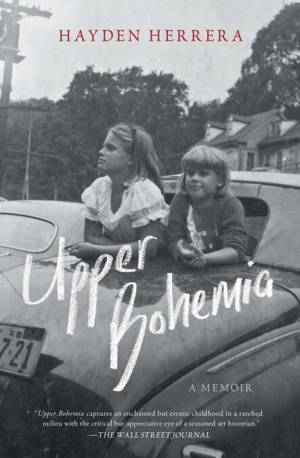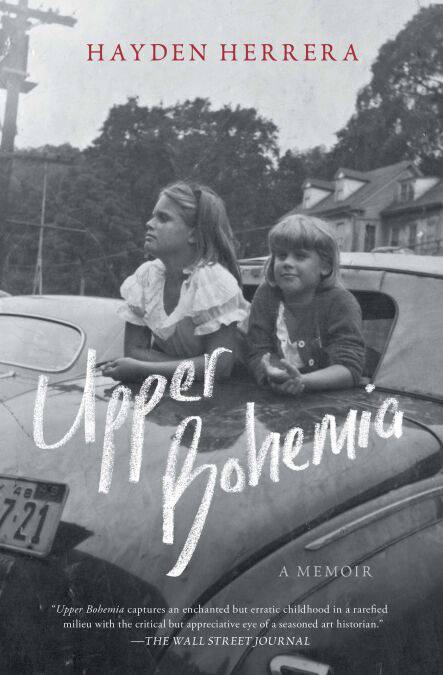
- Retrait gratuit dans votre magasin Club
- 7.000.000 titres dans notre catalogue
- Payer en toute sécurité
- Toujours un magasin près de chez vous
- Retrait gratuit dans votre magasin Club
- 7.000.0000 titres dans notre catalogue
- Payer en toute sécurité
- Toujours un magasin près de chez vous
Description
A New Yorker Best Book of 2021
A “touching, heartbreaking, and exceptional” (Town & Country) coming-of-age memoir by the daughter of artistic, bohemian parents—set against a backdrop of 1950s New York, Cape Cod, and Mexico.
Hayden Herrera’s parents each married five times; following their desires was more important to them than looking after their children. When Herrera was only three years old, her parents separated, and she and her sister moved from Cape Cod to New York City to live with their mother and their new hard-drinking stepfather. They saw their father only during the summers on the Cape, when they and the other neighborhood children would be left to their own devices by parents who were busy painting, writing, or composing music. These adults inhabited a world that Herrera’s mother called “upper bohemia,” a milieu of people born to privilege who chose to focus on the life of the mind. Her parents’ friends included such literary and artistic heavyweights as artist Max Ernst, writers Edmund Wilson and Mary McCarthy, architect Marcel Breuer, and collector Peggy Guggenheim.
On the surface, Herrera’s childhood was idyllic and surreal. But underneath, the pain of being a parent’s afterthought was acute. Upper Bohemia captures the tension between a child’s excitement at every new thing and her sadness at losing the comfort of a reliable family. For her parents, both painters, the thing that mattered most was beauty—and so her childhood was expanded by art and by a reverence for nature. But her early years were also marred by abuse and by absent, irresponsible adults. As a result, Herrera would move from place to place, parent to parent, relative to family friend, and school to school—eventually following her mother to Mexico. The stepparents and stepsiblings kept changing too.
Intimate and honest, Upper Bohemia “captures an enchanted but erratic childhood in a rarefied milieu with the critical but appreciative eye of a seasoned art historian” (The Wall Street Journal). It is a celebration of a wild and pleasure-filled way of living—and a poignant reminder of the toll such narcissism takes on the children raised in its grip.
A “touching, heartbreaking, and exceptional” (Town & Country) coming-of-age memoir by the daughter of artistic, bohemian parents—set against a backdrop of 1950s New York, Cape Cod, and Mexico.
Hayden Herrera’s parents each married five times; following their desires was more important to them than looking after their children. When Herrera was only three years old, her parents separated, and she and her sister moved from Cape Cod to New York City to live with their mother and their new hard-drinking stepfather. They saw their father only during the summers on the Cape, when they and the other neighborhood children would be left to their own devices by parents who were busy painting, writing, or composing music. These adults inhabited a world that Herrera’s mother called “upper bohemia,” a milieu of people born to privilege who chose to focus on the life of the mind. Her parents’ friends included such literary and artistic heavyweights as artist Max Ernst, writers Edmund Wilson and Mary McCarthy, architect Marcel Breuer, and collector Peggy Guggenheim.
On the surface, Herrera’s childhood was idyllic and surreal. But underneath, the pain of being a parent’s afterthought was acute. Upper Bohemia captures the tension between a child’s excitement at every new thing and her sadness at losing the comfort of a reliable family. For her parents, both painters, the thing that mattered most was beauty—and so her childhood was expanded by art and by a reverence for nature. But her early years were also marred by abuse and by absent, irresponsible adults. As a result, Herrera would move from place to place, parent to parent, relative to family friend, and school to school—eventually following her mother to Mexico. The stepparents and stepsiblings kept changing too.
Intimate and honest, Upper Bohemia “captures an enchanted but erratic childhood in a rarefied milieu with the critical but appreciative eye of a seasoned art historian” (The Wall Street Journal). It is a celebration of a wild and pleasure-filled way of living—and a poignant reminder of the toll such narcissism takes on the children raised in its grip.
Spécifications
Parties prenantes
- Auteur(s) :
- Editeur:
Contenu
- Nombre de pages :
- 272
- Langue:
- Anglais
Caractéristiques
- EAN:
- 9781982105303
- Date de parution :
- 21-06-21
- Format:
- Ebook
- Protection digitale:
- Adobe DRM
- Format numérique:
- ePub

Les avis
Nous publions uniquement les avis qui respectent les conditions requises. Consultez nos conditions pour les avis.






